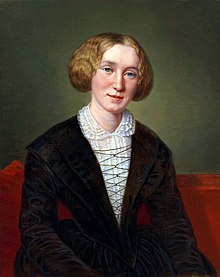
Back George Eliot Afrikaans George Eliot AN جورج إليوت Arabic جورج اليوت ARZ জৰ্জ এলিয়ট Assamese George Eliot AVK Corc Eliot Azerbaijani جورج الیوت AZB George Eliot BAR Джордж Эліят Byelorussian
George Eliot | |
|---|---|
 Eliot (Mary Ann Evans) in 1850 | |
| Born | Mary Anne Evans 22 November 1819 Nuneaton, Warwickshire, England |
| Died | 22 December 1880 (aged 61) Chelsea, London, England |
| Resting place | Highgate Cemetery (East), Highgate, London |
| Pen name | George Eliot |
| Occupation | Novelist, poet, journalist, translator |
| Alma mater | Bedford College, London |
| Period | Victorian |
| Notable works | Scenes of Clerical Life (1857) Adam Bede (1859) The Mill on the Floss (1860) Silas Marner (1861) Romola (1862–1863) Felix Holt, the Radical (1866) Middlemarch (1871–1872) Daniel Deronda (1876) |
| Spouse |
John Cross (m. 1880) |
| Partner | George Henry Lewes (1854–1878) |
Mary Ann Evans (22 November 1819 – 22 December 1880; alternatively Mary Anne or Marian[1][2]), known by her pen name George Eliot, was an English novelist, poet, journalist, translator, and one of the leading writers of the Victorian era.[3] She wrote seven novels: Adam Bede (1859), The Mill on the Floss (1860), Silas Marner (1861), Romola (1862–1863), Felix Holt, the Radical (1866), Middlemarch (1871–1872) and Daniel Deronda (1876). As with Charles Dickens and Thomas Hardy, she emerged from provincial England; most of her works are set there. Her works are known for their realism, psychological insight, sense of place and detailed depiction of the countryside. Middlemarch was described by the novelist Virginia Woolf as "one of the few English novels written for grown-up people"[4] and by Martin Amis[5] and Julian Barnes[6] as the greatest novel in the English language.
Scandalously and unconventionally for the era, she lived with the married George Henry Lewes as his conjugal partner, from 1854–1878, and called him her husband. He remained married to his wife and supported their children, even after she left him to live with another man and have children with him. In May 1880, eighteen months after Lewes's death, George Eliot married her long-time friend, John Cross, a man much younger than she, and she changed her name to Mary Ann Cross.
- ^ Ashton, Rosemary (1996). George Eliot: A Life. London: Hamish Hamilton. p. 255. ISBN 978-0241134733.
- ^ Jacobs, Alexandra (13 August 2023). "George Eliot's Scandalous Answer to 'The Marriage Question'". The New York Times. Retrieved 20 August 2023.
- ^ "George Eliot (…) is the most earnestly imperative and the most probingly intelligent of the great mid-Victorian novelists". In: Sanders, Andrew The Short Oxford History of English Literature. Clarendon Press, 1994. p. 440
- ^ Woolf, Virginia. "George Eliot." The Common Reader. New York: Harcourt, Brace, and World, 1925. pp. 166–176.
- ^ Long, Camilla.Martin Amis and the sex war, The Times, 24 January 2010, p. 4: "They've [women] produced the greatest writer in the English language ever, George Eliot, and arguably the third greatest, Jane Austen, and certainly the greatest novel, Middlemarch..."
- ^ Guppy, Shusha. "Interviews: Julian Barnes, The Art of Fiction No. 165". The Paris Review (Winter 2000). Retrieved 26 May 2012.
© MMXXIII Rich X Search. We shall prevail. All rights reserved. Rich X Search